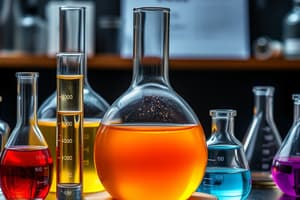Podcast
Questions and Answers
What is the first step of the Scientific Method?
What is the first step of the Scientific Method?
- Observation/Research
- Collect and Analyze Results
- Problem/Question (correct)
- Experiment
What does the hypothesis in the Scientific Method represent?
What does the hypothesis in the Scientific Method represent?
- A possible answer to the problem (correct)
- A summary of the research findings
- A conclusion based on data
- The materials needed for the experiment
Why is it important to collect and analyze results during an experiment?
Why is it important to collect and analyze results during an experiment?
- To retest and verify the results obtained (correct)
- To ensure results can be compared to other experiments
- To modify the hypothesis for future experiments
- To confirm the procedure is correct
What should be included when formulating a hypothesis?
What should be included when formulating a hypothesis?
What is the purpose of communicating results after conducting an experiment?
What is the purpose of communicating results after conducting an experiment?
Which step involves careful observation and research on the topic?
Which step involves careful observation and research on the topic?
What is a key feature of the Experiment step in the Scientific Method?
What is a key feature of the Experiment step in the Scientific Method?
After concluding the results, what should be considered for future studies?
After concluding the results, what should be considered for future studies?
What is the independent variable in John's bread experiment?
What is the independent variable in John's bread experiment?
Which of the following best describes the control group in an experiment?
Which of the following best describes the control group in an experiment?
What does the dependent variable represent in John's experiment?
What does the dependent variable represent in John's experiment?
Why does John need to maintain constants in his experiment?
Why does John need to maintain constants in his experiment?
How many trials will John conduct for each sugar variable?
How many trials will John conduct for each sugar variable?
Which action is NOT a part of the experimental process as described?
Which action is NOT a part of the experimental process as described?
What was the amount of sugar used in John's control group?
What was the amount of sugar used in John's control group?
What conclusion did John draw from his experiment regarding the control group?
What conclusion did John draw from his experiment regarding the control group?
What was Bart’s hypothesis regarding the effect of microwaves on mice?
What was Bart’s hypothesis regarding the effect of microwaves on mice?
Which group serves as the control group in Bart’s experiment?
Which group serves as the control group in Bart’s experiment?
What are the independent and dependent variables in Bart's experiment?
What are the independent and dependent variables in Bart's experiment?
Which of the following could be considered a constant in Bart's experiment?
Which of the following could be considered a constant in Bart's experiment?
What should Bart’s conclusion be based on the experiment's results?
What should Bart’s conclusion be based on the experiment's results?
Flashcards are hidden until you start studying
Study Notes
The Scientific Method
- A series of steps used to investigate natural occurrences
- Starts with a problem/question
- Includes observation/research
- Requires the formulation of a hypothesis
- Involves conducting an experiment
- Requires collecting and analyzing results
- Ends with a conclusion
- Communicates the results
The Scientific Method Steps
- Problem/Question: Develop a question or problem that can be solved through experimentation
- Observation/Research: Make observations and research your topic of interest.
- Formulate a Hypothesis: Predict a possible answer to the problem or question.
- Experiment: Develop and follow a procedure.
- Collect and Analyze Results: Modify the procedure if needed. Confirm the results by retesting. Include tables, graphs, and photos.
- Conclusion: Include a statement that accepts or rejects the hypothesis.
- Communicate the Results: Be prepared to present the project to an audience. Expect questions.
Bart Simpson's Experiment
- Problem/Question: Do microwaved mice get extra strong?
- Hypothesis: Mice exposed to microwaves will be extra strong.
- Control Group: Mice not exposed to microwaves.
- Independent Variable: Microwave exposure.
- Dependent Variable: Strength (ability to push a heavy block of wood).
- Constants: Same block of wood, same food, time of day, approximate same size mice, etc.
- Conclusion: Microwave exposure does not significantly change the strength of mice.
Studying That Suits You
Use AI to generate personalized quizzes and flashcards to suit your learning preferences.




